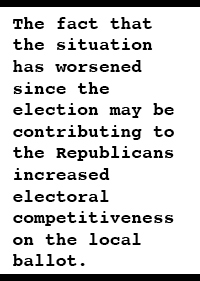By Jim Ellis
June 8, 2021 — On Saturday, Republican candidates picked up three victories in a trio of Texas mayoral runoffs, the most surprising of which came in the Mexican border city of McAllen where the Hispanic population is close to 85 percent.
 McAllen City Commissioner (Council) Javier Villalobos, a former Hidalgo County Republican Party chairman, won the mayoral runoff election with a 51-49 percent victory. This on the heels of the Texas-Mexico border region voting much more Republican in 2020 than in previous electoral history. From the congressional district that houses McAllen, Rep. Vicente Gonzalez (D-McAllen) won his November re-election contest with only a 50.5 – 47.6 percent victory margin.
McAllen City Commissioner (Council) Javier Villalobos, a former Hidalgo County Republican Party chairman, won the mayoral runoff election with a 51-49 percent victory. This on the heels of the Texas-Mexico border region voting much more Republican in 2020 than in previous electoral history. From the congressional district that houses McAllen, Rep. Vicente Gonzalez (D-McAllen) won his November re-election contest with only a 50.5 – 47.6 percent victory margin.
In Ft. Worth, an election that broke more definitively along partisan lines, though all of the mayoral elections in the state are nonpartisan in that the candidate’s political party affiliation does not appear on the ballot, Republican Mattie Parker defeated Tarrant County Democratic Party chair Deborah Peoples. The spread was 54-46 percent in a contest where turnout more than doubled the aggregate mayoral vote of four years ago. Voter participation was up in all three of the Texas city runoff elections, but none like the huge increase in Ft. Worth.
The least partisan of the races occurred in Arlington, where former police officer and local businessman Jim Ross defeated Arlington City Councilman Michael Glaspie, also with a 54-46 percent margin. In this election, law enforcement seemed to dominate the campaign as five different police and fire associations rallied to support Ross.
As mentioned above, South Texas voting ventured more toward the Republicans in November even though Democrats still proved victorious in the region. Biden’s margin over then-President Trump dropped as low as 50-48 percent in Rep. Gonzalez’s 15th District, and under 52 percent in three of the four CDs that touch the Texas-Mexico border.
The change could be related to the problems on the border, which obviously affect the cities and towns along the Rio Grande River to a greater degree than any other place in the Lone Star State. The fact that the situation has worsened since the election may be contributing to the Republicans increased electoral competitiveness on the local ballot.
Considering the McAllen mayoral election result and Rep. Filemon Vela (D-Brownsville) not seeking re-election, the possibility that Republican map drawers, who have the redistricting pen, will attempt to draw a seat that would be competitive for a GOP candidate becomes more realistic. Vela represents the 34th CD that covers the region northwest of Victoria, then dips around and south of Corpus Christi along the Gulf of Mexico all the way to the border in a region that includes the cities of Brownsville and Harlingen.
Tarrant County, which houses both Ft. Worth and Arlington, gave President Biden a slight two-tenths of one percentage-point victory over former President Trump last November, which was a significant outcome. The result marked the first time since Lyndon Johnson claimed Tarrant in 1964 that a Democrat outpolled a Republican presidential candidate. This gave the argument that the Democrats are on the move in North Texas further credibility since now the Ft. Worth area appeared to be moving in that direction as well as Dallas.
In the 6th Congressional District, which houses most of the city of Arlington, the late Rep. Ron Wright (R-Arlington) lost the southeast Tarrant County region in both of his victorious congressional elections and was forced to depend upon rural Ellis and Navarro Counties to provide him his victory margins. This, coupled with the congressional results in the Dallas area, provided evidence that the north Texas region was beginning to turn in favor of the Democrats.
Whether Saturday’s mayoral runoff elections are a clue that the Texas electorate is returning to its traditional voting pattern is unclear because low turnout elections, even when the participation factor has increased over similar past electoral contests, are typically not wholly proficient indicators of future results.
The current elections can provide us hints, however, especially when the opposite results were expected. Therefore, if Democrats are truly gaining a stronger political foothold in Texas, Saturday’s local election results may have dealt them a noteworthy setback.

